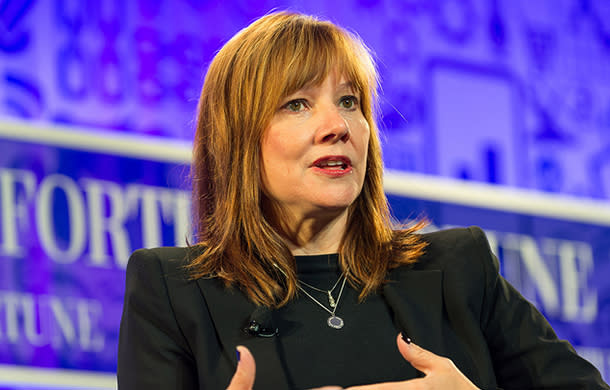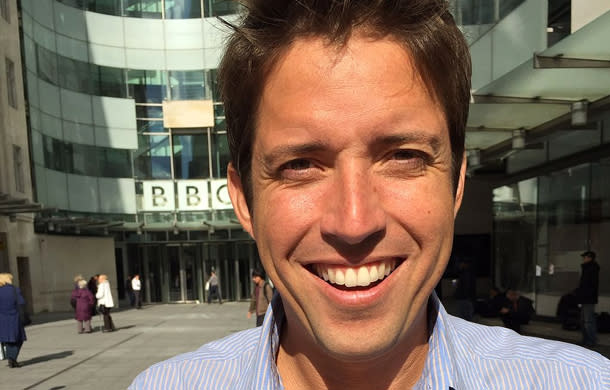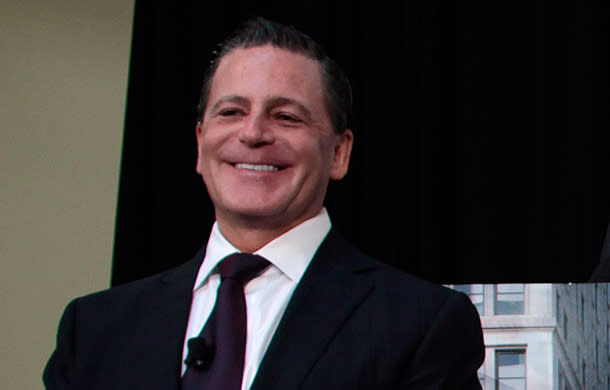The 10 Entrepreneurs Who Defined 2014
From game-changing technologies to record-setting IPOs to scandals that would make a starlet blush, this was a year that had it all. Some startups hit the big time; others hit the skids. Entrepreneurs went from zeros to heroes (and vice versa). Here are 10 business leaders who dominated headlines in 2014 and set the stage for the year ahead—for better or for worse.
Tony Fadell
Tony Fadell holds the key to the home of the future. A former Apple executive who spearheaded development of the iPod, Fadell is founder and CEO of Nest Labs, whose Wi-Fi-enabled Nest Learning Thermostat is the shining symbol of the connected-home revolution. The Linux-based thermostat tracks your schedule and programs its software according to your comings and goings, slashing heating and cooling bills up to 20 percent. Three years after it first hit the market, the $249 product has saved users an estimated 2 billion kilowatt-hours of energy, enough to power 180,000 American homes for a year.
Nest Labs further bolstered its stature as the poster child for the Internet of Things with Nest Protect, a $99 web-connected smoke and carbon monoxide detector launched in November 2013. Two months later, Google purchased Nest Labs for $3.2 billion in cash, its second-largest acquisition to date. Fadell continues to run Nest as a quasi-independent company, and analysts forecast the firm will leverage Google’s reach and resources to extend its home invasion to the next wave of smart devices, like appliances and locks.
Nest Labs is already spending Google’s money, acquiring camera startup Dropcam in June for $555 million. Dropcam enables consumers to access live or stored video of their home or business from any computer, tablet or smartphone; moving forward, Nest Labs products will also tout video capabilities that allow users to more closely monitor their property. Nest Labs is aligning with companies like Control4, Crestron and Remote Technologies Incorporated to integrate its products into their home-automation systems.
You don’t need to clean up the guest room, but make no mistake: Fadell is moving in.

Mary Barra
Image credit: Fortune Live Media | Flickr
Mary Barra
History will remember Mary Barra as the first female CEO of a major automobile company. How else it will remember her is still an open question. Thirty-four years after beginning her General Motors career as a co-op student, Barra took over as CEO in mid-January, but she had little time to savor the accomplishment. Less than a month into her new role, GM recalled almost 780,000 older-model compact cars found to contain a defective ignition switch capable of shutting off engines without warning—a glitch blamed for 22 crashes and six deaths.
GM doubled the recall two weeks later, and the crisis continued to escalate in the months to follow. At press time, Barra-led GM had issued a record-setting 76 recalls spanning 30 million vehicles worldwide, including 26.5 million in the U.S. On April 1, Barra appeared before a U.S. House panel, telling lawmakers she was “deeply sorry” for GM’s failure to respond more proactively; the following day, a Senate hearing accused the automaker of “criminal” behavior and “a culture of coverup,” and in May, the U.S. Department of Transportation zapped the company with a $35 million fine. GM also faces more than 100 death claims filed by victims’ families and anticipates that settlements will cost between $400 million and $600 million.
The scandal has made it clear that the GM culture requires a massive makeover, and Barra seems up to the challenge. She fired 15 staffers after an internal probe revealed that the faulty switches were first diagnosed in 2001, and she has also jettisoned at least seven other high-ranking executives—swift, decisive moves, at least according to GM’s lumbering standards. Barra has additionally promised to roll out technological innovations like hands-free automated driving systems, vehicle-to-vehicle connectivity, 4G LTE high-speed mobile broadband and new mixed-material body structures that require 20 percent fewer parts.
Time will tell whether GM can regain consumer trust and investor enthusiasm, but so far Barra seems to be steering the company back in the right direction.

Evan Spiegel
Image credit: cellanr | Flickr
Evan Spiegel
Snapchat co-founder and CEO Evan Spiegel made international headlines in late 2013 when he turned down a $3 billion cash acquisition offer from Facebook. A year later, it’s clear the 24-year-old knew exactly what he was doing: Snapchat is now valued at a reported $10 billion. And while Facebook is hemorrhaging young users, Snapchat remains all the rage among the under-20 set; half of its 100 million-plus users are between the ages of 13 and 17.
If you’re old enough to vote, you might wonder what all the fuss is about. The Snapchat mobile app enables users to capture photos (aka “snaps”) and video clips with a smartphone, overlay a text message and transmit the image to friends. Content is available to the recipient for one to 10 seconds; after that, it vanishes permanently from both smartphones and from Snapchat’s servers. (Or at least it’s supposed to: In October, hackers leaked videos and photos of roughly 200,000 teenagers posted via Snapchat and stored on a third-party website.)
As of mid-2014, users were sharing 700 million photos each day; Snapchat Stories—links of shared content available for a 24-hour period—account for another 500 million daily views. Ephemerality is the point: Unlike other social networks—where content lives forever, sometimes to the chagrin of users—Snapchat is all about the now. (Which explains why the average Snapchat user checks his or her account an average of 14 times a day: You could blink and miss something.)
Snapchat’s lofty valuation is all the more eye-popping given that the startup has no established revenue stream (at least as of press time). But Spiegel has assembled an impressive executive roster headlined by COO Emily White, former director of business operations for Facebook-owned photo-sharing app Instagram, suggesting that monetization efforts are coming sooner rather than later. Snapchat also continues to expand its feature set via new messaging and video chat options, as well as push notifications.
Its photos may disappear, but Snapchat looks like it’s here to stay.

Dr. Dre
Image credit: Aaron Frutman | Flickr
Dr. Dre
Forgot about Dre? Big mistake. Sure, it’s been more than two decades since he rewrote the rules of hip-hop with The Chronic and 15 years since he released a new album, but the man born Andre Young remains ubiquitous in popular culture.
Beats Electronics, which Dre launched in 2008 in partnership with Interscope Geffen A&M chairman Jimmy Iovine, dominates the U.S. premium headphones market, accounting for 61 percent of sales nationwide, according to The NPD Group. Beats by Dre can credit its success in part to its popularity among tastemakers like Nicki Minaj, Lady Gaga and LeBron James (the latter a company stakeholder). The competition is so desperate for the same cachet that in August, Bose brokered a deal to become the official headphone of the National Football League, an agreement that blocks NFL stars (including Beats endorsers Richard Sherman and Colin Kaepernick) from wearing Beats products during post-game interviews and league-affiliated events.
Beats Electronics expanded into streaming media early this year via the subscription-based Beats Music, which touts an on-demand library of 20 million songs as well as algorithm-based personalized recommendations and expert suggestions. Priced at $9.99 per month or $99.99 per year, Beats Music has reportedly struggled to poach subscribers from rivals Spotify and Rdio, but that didn’t stop Apple from gobbling up Beats this summer in a cash and stock deal valued at $3 billion, vaulting Dre’s personal fortune to $800 million and making him the richest figure in hip-hop history.
It’s still unclear exactly how Beats will fit into the larger Apple ecosystem, but Dre’s celebrity connections and seemingly eternal cool will no doubt boost Apple’s street cred and bottom line.

Travis Kalanick
Image credit: OFFICIAL LEWEB PHOTOS | Flickr
Travis Kalanick
Ride-sharing service Uber continued driving incumbent taxi operators crazy in 2014. Five years after CEO Travis Kalanick co-founded the company, whose smartphone app lets passengers request pickups from affiliated vehicles, the Uber network spans more than 200 cities in six continents. Its greatest stronghold remains the U.S., where it covers 55 percent of the population and completes seven times as many rides as archrival Lyft, according to data compiled by investment advisory firm FutureAdvisor. Uber riders also spend 12 times as much money as their Lyft counterparts, which helps explain why Uber is valued at more than $15 billion and how Kalanick has raised a reported $1.5 billion in venture capital.
But the bigger Uber grows, the more its critics fight back. Government officials and business owners in the startup’s native San Francisco, as well as Chicago, Toronto, Brussels and Seoul, have taken measures to block Uber, with some adversaries claiming that ride-sharing companies are effectively illegal taxicab operations that skirt fair business practices and threaten passenger safety. More than 10,000 taxi drivers across Europe staged protests against Uber this summer, arguing that the firm enjoys an unfair pricing advantage because it is not subject to taxi insurance, local licenses and other standard operating costs. Uber continues operating in most contested markets while pleading its case to local lawmakers.
Uber has also made enemies over its aggressively cutthroat business tactics. Following reports that some New York City Uber staffers ordered rides from competing service Gett only to cancel them, Uber apologized on its official blog; in August, Lyft claimed that Uber employees across the U.S. ordered and canceled more than 5,000 Lyft rides over a 10-month period. From there, tech site The Verge reported on “Operation SLOG,” an effort to strong-arm drivers from competing ride-sharing startups into joining the Uber ranks. The revelations resulted in a wave of denouncements from consumers, media and the Silicon Valley elite.
Kalanick had better fasten his seatbelt—it’s going to be a bumpy ride.

Reed Hastings
Image credit: JD Lasica | Flickr
Reed Hastings
Netflix killed the video store—and with Blockbuster and other rental chains in the rearview, broadcast TV and movie theaters are next on Reed Hastings’ hit list. Three years removed from a controversial price hike that sent subscribers scrambling and stock values into free-fall, founder and CEO Hastings reigns as the king of new media: Netflix added 2.82 million U.S. streaming-video subscribers during the first half of 2014, up from 2.66 million during the same period last year. The company’s international growth is even more impressive, with 2.87 million new overseas customers signing on during the same six-month period, compared to 1.63 million a year ago. This fall Netflix rolled out services in France, Germany and four other European countries, promising curated libraries for each individual market.
Hastings has built more than a streaming-video platform, of course—Netflix is now one of the most influential content creators in Hollywood. Original series like House of Cards, Orange Is the New Black and BoJack Horseman are redefining how television is distributed and consumed, making available complete seasons of new episodes in one fell swoop, to the delight of binge-watchers everywhere. Beyond massive social media buzz and critical acclaim, Netflix is generating approval from TV’s old guard, earning 31 Emmy Award nominations in 2014 and bringing home seven statuettes.
Coming attractions: feature films that bypass traditional theatrical release channels. Hastings has signed with Adam Sandler’s Happy Madison Productions to produce four original movies that will premiere exclusively on Netflix, and the company will finance The Weinstein Company’s Crouching Tiger, Hidden Dragon: The Green Legend, slated to debut on Netflix the same day it opens in IMAX theaters in mid-2015. Several of the nation’s largest theater chains are already threatening to boycott the film, so get your popcorn ready.

Jack Ma
Image credit: World Economic Forum | Flickr
Jack Ma
Jack Ma’s fairytale journey from schoolteacher to China’s richest man was the signature entrepreneurial storyline of 2014, an arc that culminated in his e-commerce company Alibaba completing the splashiest IPO in Wall Street history.
Ma was no technology wunderkind. He failed his university entrance exams twice before gaining admission to Hangzhou Teachers University in 1984; after graduation he spent five years teaching English for 120 yuan (about $15) per month. A visit to the U.S. opened his eyes to the possibilities of the internet, and in 1995 he founded business directory China Yellowpages, widely credited as China’s first web-based company. The site sputtered, and in 1999 Ma pooled $60,000 from friends to launch Alibaba, operating the e-retailer inside his Hangzhou apartment. Fast-forward 15 years, and Alibaba drives 80 percent of China’s online sales and accounts for more than half of the nation’s parcel deliveries, yielding profits that exceed those of Amazon and eBay combined.
Alibaba went public Sept. 18, raising $21.8 billion to shatter Visa’s $17.9 billion offering in 2008 as the biggest U.S. opening day ever. Less than a week later, Alibaba underwriters exercised an option to sell additional shares, hiking the IPO to $25 billion; Ma, who owns about 7.8 percent of Alibaba post-IPO, is now worth an estimated $21.9 billion. Challenges remain, like expanding outside the Chinese market and grappling with the country’s mercurial government. But the narrative already has the makings of a feel-good Hollywood movie—so it should come as no surprise that a feature film dramatizing Ma’s rags-to-riches rise is already in the works.

Nicholas Woodman
Image credit: cellanr | Flickr
Nicholas Woodman
GoPro CEO and founder Nick Woodman is taking video to places it has never gone before. His company’s ubiquitous Hero high-definition personal cameras are a must-have accessory for action-sports daredevils the world over, resulting in extraordinary point-of-view footage captured by snowboarders soaring into the atmosphere, cyclists hurtling down serpentine trails and scuba divers plumbing the ocean’s depths. Users uploaded close to three years’ worth of footage in 2013 alone, and the viral hits keep coming—a mid-2014 clip shot by an expectant father rushing his pregnant wife to the delivery room yielded more than 1.8 million views in its first week on YouTube.
Available in a range of models priced between $130 and $500, GoPro Hero ranks as the bestselling video camera brand in the U.S., with 2013 sales of $986 million, accounting for 45 percent of the American camcorder market, according to research firm The NPD Group. GoPro also offers dozens of camera mounts tailored for specific activities, including Fetch, a canine-optimized harness promising a dog’s-eye view of life.
Woodman took GoPro public in June, raising $427 million on the first day of trading. The company is staking its future growth on evolving beyond hardware into a full-fledged multimedia platform, rolling out dedicated user-generated video channels across YouTube, Microsoft’s Xbox Live and the Virgin America airline. It’s the type of ballsy transformation that’s been successfully navigated by Apple and precious few others—but like GoPro’s customers, Woodman isn’t one to play it safe.

Beyonc?
Image credit: mp3waxx.com | Flickr
Beyoncé
It’s Beyoncé’s world—the rest of us are just grooving in it. Galvanized by the late-2013 release of her self-titled fifth studio LP, the fastest-selling album ever to hit Apple’s iTunes, Queen Bey reached new heights in 2014. Her Mrs. Carter Show concert tour sold 1.8 million tickets over 126 international dates, generating revenue of $212 million. In June she hit the road again, this time teaming with husband Jay-Z for the On the Run tour, which grossed more than $100 million during its first 19 North American stops alone and culminated in a prime-time HBO special. According to Billboard, Beyoncé is the highest-paid black artist in popular music history, surpassing Michael Jackson, Janet Jackson and Prince.
In addition to her entertainment career, Beyoncé founded ready-to-wear fashion line House of Deréon in 2004 in partnership with her mother, Tina Knowles; eight years later, she launched shop.beyonce.com, an online marketplace for branded apparel and accessories. Entrepreneurs should pay close attention to how Beyoncé has built her brand. Arguably no performer connects on a more profound personal level with fans: Songs like “Single Ladies (Put a Ring on It)” and “Run the World (Girls)” are anthems of female empowerment, and as her music has grown more complex and daring, her lyrics have become increasingly intimate, exploring themes like motherhood, marriage and sexuality with refreshing candor.
Beyoncé has usurped near-total control of her career and image, firing a series of managers (including father Mathew Knowles, ousted in 2011) along the way. She recorded the Beyoncé album in secret and released it via iTunes with no advance fanfare, professing boredom with traditional music marketing and a desire to interface more directly with audiences. Beyoncé has since sold more than 3 million copies, spawning five singles and setting the stage for acts like U2 to roll out their own albums via iTunes sneak attack. The traditional music industry model no longer works, but Beyoncé is pioneering a new model that does—and everyone should listen up.

Dan Gilbert
Image credit: Fiat Chrysler Automobiles: Corporate | Flickr
Dan Gilbert
Dan Gilbert is the comeback kid. The founder and chairman of Quicken Loans, the nation’s largest online retail mortgage lender, Gilbert is spearheading the revitalization of his native Detroit, investing $1.3 billion (and counting) to acquire and renovate more than 60 commercial properties occupying about 9 million square feet of Motor City real estate. Those buildings now house 12,000 employees from across Gilbert’s Rock Ventures business portfolio of roughly 110 affiliated companies, including Rock Gaming, the developer and owner of urban casinos in the Cleveland, Cincinnati and Baltimore markets. In September, Gilbert agreed to pay $1.25 million of his own money for a road project to widen downtown Detroit’s Interstate 375 exit from one lane to three, a move to help alleviate traffic jams heading into the Greektown Casino-Hotel, which he also owns.
Gilbert—whose net worth is estimated at $4 billion—also spent 2014 rehabilitating his own public image. As the majority owner of the National Basketball Association’s Cleveland Cavaliers, he received worldwide attention in 2010 for a scathing open letter (published in the much-maligned comic sans font) decrying superstar LeBron James’ decision to leave the team to sign with the Miami Heat. The letter was roundly mocked in the national media, and the NBA fined Gilbert $100,000 for his remarks.
This summer, Gilbert and James met in person to hash out their differences; Gilbert apologized for the letter, the two men embraced, and days later James signed a two-year agreement to return to the Cavaliers as a free agent. The team’s 2014-15 season ticket packages sold out in a matter of hours, and James’ star wattage is expected to turbocharge Cleveland nightlife and tourism, earning local businesses an additional $75 million per year.
King James may be the NBA’s most complete player, but nobody rebounds like Dan Gilbert.

 Yahoo News
Yahoo News 
